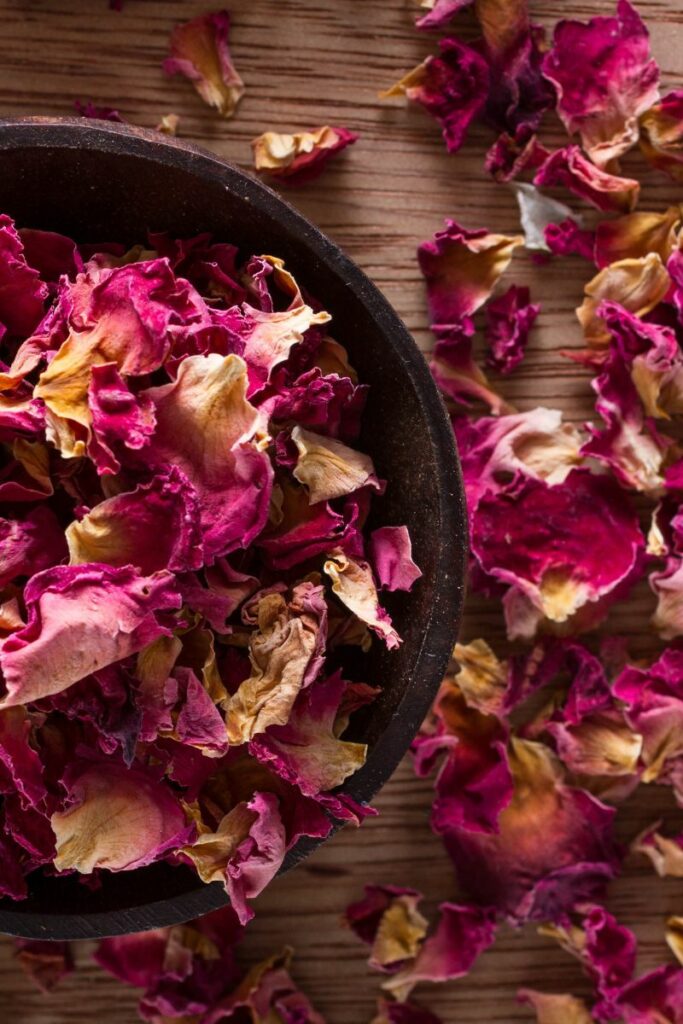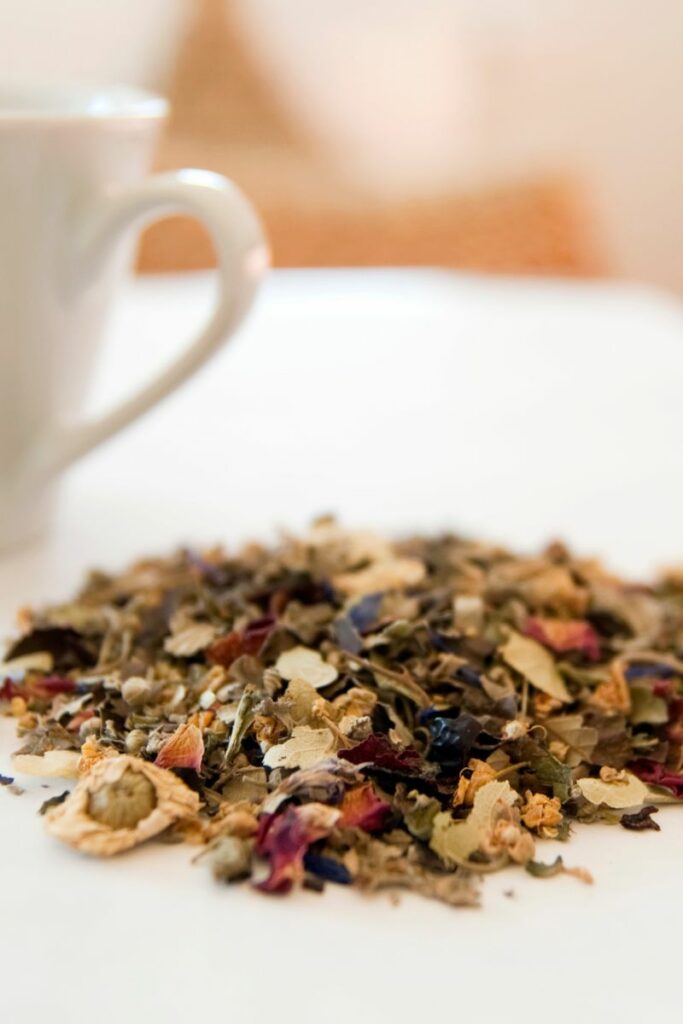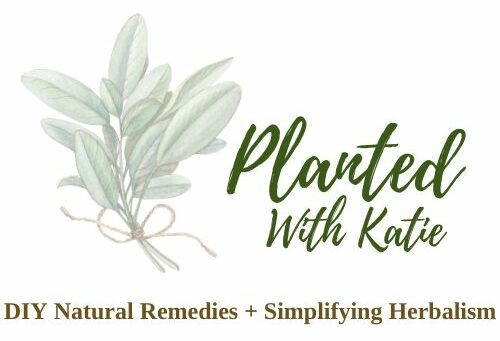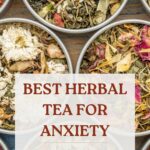Best Herbal Tea for Anxiety: Natural Stress Relief
Finding the best herbal tea for anxiety can really help you feel better when you're stressed. Drinking a warm cup of tea made with the right herbs can calm your mind and body, helping you relax after a busy day or during tough moments.

Disclaimer: This is not medical advice. Information and statements shown here are for educational and informational purposes only and are not to replace the advice of your healthcare professional.
This post may include affiliate links. Please refer to our disclaimer for full disclosure.
In this article, we'll talk about a special tea blend made with Lemon Balm, Chamomile, Rose Petals, and Rooibos. Each of these herbs is known for helping to reduce stress and make you feel more peaceful. This tea is a simple and natural way to bring some calm into your daily life.
The Power of Herbal Teas in Managing Anxiety
Herbal teas have been used for centuries to help calm the mind and body. Unlike regular teas made from the tea plant (Camellia sinensis), herbal teas like Lemon Balm, Chamomile, Rose Petals, and Rooibos come from different plants known for their soothing properties. These teas are a great way to manage anxiety symptoms naturally, without the side effects that can come with conventional medications.
Lemon Balm and Chamomile are popular herbal remedies that help reduce stress levels and improve sleep quality. Rose Petals add a gentle, calming effect, while Rooibos is rich in bioactive compounds that support overall mental health.
Together, these herbs create a powerful, caffeine-free tea blend that can be an effective treatment for anxiety relief. By including this blend in your daily routine, you can help lower cortisol levels and promote a sense of calm.
4 Herbs in The Best Herbal Tea for Anxiety
This herbal tea blend is carefully crafted with four powerful herbs, each offering unique benefits for calming the mind and easing anxiety. Let’s explore what makes each herb special.
1. Lemon Balm (Melissa officinalis L.)
Lemon Balm is a member of the mint family and has been used in traditional medicine since the Middle Ages. It’s known for its cooling and calming effects on the nervous system, which help reduce stress and anxiety.

Lemon Balm contains natural compounds that soothe the mind, lower stress levels, and help you feel more relaxed. It’s often used in herbal medicine to support mental health and is a great choice for anyone looking to manage symptoms of anxiety naturally.
Main Benefits for Anxiety:
- Calms the nervous system
- Reduces stress and anxiety
- Promotes relaxation and mental clarity
2. Chamomile (Matricaria chamomilla)
Chamomile is one of the most popular herbs for relaxation and is well-known for its soothing properties. This gentle herb acts as a mild sedative, helping to calm your mind and body, which makes it easier to fall asleep.

Drinking a cup of Chamomile tea before bed can improve sleep quality, especially if you’re dealing with stress or anxiety. Recent research and clinical trials have shown that Chamomile can help reduce symptoms of anxiety and improve overall mental health.
Main Benefits for Anxiety:
- Acts as a mild sedative to calm the mind
- Reduces anxiety symptoms
- Improves sleep quality and relaxation
3. Rose Petals (Rosa spp.)
Rose Petals are more than just a beautiful flower; they also have uplifting and heart-calming properties. In traditional medicine, Rose Petals have been used to ease emotional stress and anxiety.

The natural compounds in Rose Petals help soothe the mind and lift the mood, making them an excellent addition to this blend. The gentle, floral flavor also adds a comforting and pleasant taste to the tea, enhancing its calming effects.
Main Benefits for Anxiety:
- Uplifts the mood and soothes emotional stress
- Calms the heart and mind
- Provides a comforting, floral aroma and taste
4. Rooibos (Aspalathus linearis)
Rooibos is a caffeine-free tea from South Africa that’s rich in antioxidants. These antioxidants help protect your body from stress and support overall mental health.

Rooibos has a slightly sweet, nutty flavor that balances the blend and adds a soothing touch. It’s a great natural remedy for reducing stress levels and promoting relaxation. Plus, the antioxidants in Rooibos can have a positive effect on your heart rate and stress level, making it a healthy choice for those looking to manage anxiety.
Main Benefits for Anxiety:
- Provides antioxidant support to reduce stress
- Promotes relaxation without caffeine
- Helps balance heart rate and lower stress levels
Together, these herbs create a powerful blend that not only tastes great but also offers significant health benefits. Whether you’re dealing with anxiety disorders, sleep disorders, or just need a natural way to relax, this tea blend is a good idea to include in your daily routine. Each cup of this herbal tea provides a calming experience that helps reduce stress and anxiety naturally, without the adverse effects often associated with commercial products.
How to Make the Perfect Cup of Anxiety-Relieving Herbal Tea
Making a strong, anxiety-relieving herbal tea is simple and rewarding. Here’s a step-by-step guide to creating a powerful 1-ounce blend that brings out the best in each herb.
Ingredients:
- 0.4 ounces Lemon Balm (Melissa officinalis L.)
- 0.3 ounces Chamomile (Matricaria chamomilla)
- 0.2 ounce Rooibos (Aspalathus linearis)
- 0.1 ounces Rose Petals (Rosa spp.)
Preparation:
- Mix the Herbs:
- Combine the Lemon Balm, Chamomile, Rose Petals, and Rooibos in a small bowl.
- Mix them well to create a uniform blend.
- Store the Blend:
- Place the herbal mix in an airtight container to preserve freshness.
- Store it in a cool, dark place until you’re ready to brew your tea.
Brewing Instructions:
- Boil Water:
- Bring 2 cups of water (16 ounces) to a boil.
- Measure the Tea:
- Use 1 tablespoon (about 3 grams) of the herbal blend for a strong infusion.
- Steep the Tea:
- Place the herbs in a teapot or a large mug.
- Pour the boiling water over the herbs.
- Cover and let the tea steep for 15-20 minutes to extract the maximum potency from the herbs.
- Strain and Serve:
- After steeping, strain the tea to remove the herbs.
- Pour the tea into your favorite cup.
Tips for Enhancing Flavor and Potency:
- Honey or Lemon: Add a teaspoon of honey or a squeeze of fresh lemon juice to enhance the flavor and add extra soothing benefits.
- Longer Steeping: For an even stronger infusion, you can steep the tea for up to 30 minutes, but be aware that the flavor will be more intense.
- Double the Herbs: If you prefer a more powerful tea, use 2 tablespoons of the blend instead of 1.
- Multiple Cups: For continuous relief, consider brewing a larger batch and drinking it throughout the day.
This strong infusion is designed to maximize the calming effects of each herb, offering powerful anxiety relief with every sip. Enjoy your tea as part of a daily routine to support mental well-being and relaxation.

When and How to Use This Tea for Maximum Benefit
Drinking herbal tea can be a great way to manage anxiety and stress naturally. To get the most out of this tea, it’s important to know the best times to drink it and how often you should enjoy a cup.
Best Times to Drink the Tea
The best time to drink this anxiety-relieving herbal tea is in the evening or during high-stress moments. If you’re feeling overwhelmed during the day, taking a break to sip on this tea can help calm your mind and lower your stress levels. In the evening, a warm cup of tea can help you unwind and prepare for a restful night’s sleep, especially if you struggle with sleep disorders or have trouble falling asleep due to anxiety.
Suggested Frequency of Consumption
For ongoing anxiety relief, it’s a good idea to drink this tea on a regular basis. You can have 1-2 cups of tea per day, depending on your needs. Start your day with a cup if you anticipate a stressful day, and enjoy another cup in the evening to help you relax before bed. Consistent use can have a positive effect on managing symptoms of anxiety over time.
Incorporating the Tea into Your Daily Routine
Making this herbal tea a part of your daily self-care routine is simple. You can enjoy a cup in the morning while planning your day or in the evening as part of your wind-down routine. Pairing your tea with other calming activities, like reading, meditation, or a warm bath, can enhance its relaxing effects. Using this tea regularly can help maintain a balanced mood and reduce your overall stress level.
By incorporating this tea into your daily routine, you’re using a natural remedy to support your mental health. With consistent use, you’ll likely notice a reduction in anxiety symptoms and a greater sense of calm throughout your day.
Possible Risks and Contraindications
While herbal teas can be a great way to manage anxiety naturally, it's important to be aware of any potential risks or contraindications, especially if you have certain health conditions.
Lemon Balm (Melissa officinalis L.)
Lemon Balm is generally safe for most people, but if you have thyroid issues, especially hypothyroidism, it’s a good idea to consult with a medical professional before using this herb. Lemon Balm may interfere with thyroid function, so it's important to get advice if you have a thyroid condition.
Chamomile (Matricaria chamomilla)
Chamomile is a popular tea known for its calming effects, but it can cause allergic reactions in some people, especially those who are allergic to plants in the daisy family, like ragweed. If you have allergies to these plants, you should avoid Chamomile. Additionally, if you are pregnant or breastfeeding, it's best to talk to your healthcare provider before using Chamomile, as it can have effects on pregnancy.
Rose Petals (Rosa spp.)
Rose Petals are generally safe, but like any natural product, they can cause allergic reactions in some individuals. If you have sensitive skin or are prone to allergies, it’s a good idea to start with a small amount and see how your body reacts. Pregnant women should also consult their healthcare provider before using Rose Petals, as their safety during pregnancy hasn't been fully established.
Rooibos (Aspalathus linearis)
Rooibos is a caffeine-free tea and is generally safe for most people. However, it can lower blood pressure, so if you already have low blood pressure or are on medication to manage your blood pressure, you should check with your medical provider before drinking large amounts of Rooibos tea. Also, if you are pregnant or have a medical condition, it’s always wise to consult with your healthcare provider before adding new herbal teas to your routine.
General Advice
It’s important to listen to your body when trying any new herbal tea or supplement. If you notice any adverse effects, like an allergic reaction or unusual symptoms, stop using the tea and consult a healthcare provider. While this tea blend is designed to help with anxiety and stress, everyone’s body reacts differently, so adjusting the amount you drink or how often you use it may be necessary.
Conclusion
In conclusion, this herbal tea blend is a natural and effective way to help manage anxiety and stress. Drinking this blend regularly can have a positive effect on your stress levels and help ease the symptoms of anxiety.
We’d love to hear about your experiences with this tea! Feel free to share your thoughts or ask any questions in the comments section below. Your feedback is valuable, and I'm here to help you on your journey to better health.



